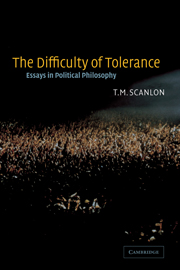Book contents
- Frontmatter
- Contents
- Acknowledgments
- Introduction
- 1 A theory of freedom of expression
- 2 Rights, goals, and fairness
- 3 Due process
- 4 Preference and urgency
- 5 Freedom of expression and categories of expression
- 6 Human rights as a neutral concern
- 7 Contractualism and utilitarianism
- 8 Content regulation reconsidered
- 9 Value, desire, and quality of life
- 10 The difficulty of tolerance
- 11 The diversity of objections to inequality
- 12 Punishment and the rule of law
- 13 Promises and contracts
- Index
12 - Punishment and the rule of law
Published online by Cambridge University Press: 15 December 2009
- Frontmatter
- Contents
- Acknowledgments
- Introduction
- 1 A theory of freedom of expression
- 2 Rights, goals, and fairness
- 3 Due process
- 4 Preference and urgency
- 5 Freedom of expression and categories of expression
- 6 Human rights as a neutral concern
- 7 Contractualism and utilitarianism
- 8 Content regulation reconsidered
- 9 Value, desire, and quality of life
- 10 The difficulty of tolerance
- 11 The diversity of objections to inequality
- 12 Punishment and the rule of law
- 13 Promises and contracts
- Index
Summary
This essay will consider how some central issues that Carlos Nino discussed in his writings on the philosophical theory of punishment are relevant to the difficult empirical and political problem of building a legal order that preserves the rule of law and provides remedies for victims of past human rights abuses. Carlos Nino was remarkable in combining philosophical scholarship with important and courageous contributions to this difficult political problem. My first contact with him came when he submitted his article “A Consensual Theory of Punishment” to the journal Philosophy and Public Affairs, of which I was then an associate editor. This article attempts to provide a justification for criminal penalties that avoids retributivism but also explains why a system of penalties cannot be justified solely on the basis of its deterrent effects. It was, for me, an exciting paper to read. I very much agreed with the main line of Nino's theory, although I thought that there were certain rather subtle ways in which it went astray. We had a brief but stimulating correspondence about these issues. In retrospect it is striking – indeed, to someone like me who has spent his adult life in the sheltered academy it is truly amazing – that the seemingly academic issues discussed in Nino's article, including the rather subtle point on which we disagreed, turned out later to be of very considerable practical importance.
- Type
- Chapter
- Information
- The Difficulty of ToleranceEssays in Political Philosophy, pp. 219 - 233Publisher: Cambridge University PressPrint publication year: 2003
- 7
- Cited by

